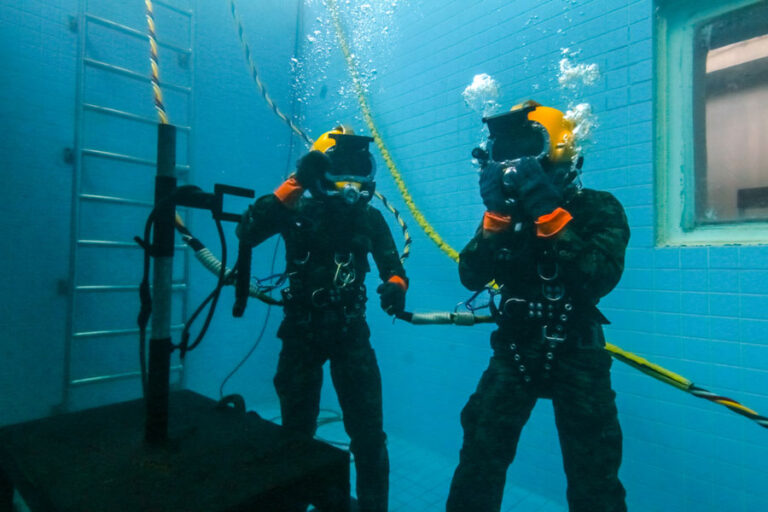The commercial diving industry is booming, and the demand for qualified individuals to fill these positions continues to grow. If you are interested in becoming a commercial diver, there are some requirements that you must meet first. It’s important to know what it takes before pursuing this career path so that you can determine if it is right for you!
Table of Contents
What is a commercial diver and what do they do
Commercial diving is a broader term that covers a lot more work and career fields than most people assume. Commercial diving is a profession that in many cases, combines construction with scuba diving. A commercial diver works in a variety of underwater settings such as deep seas, lakes, or other submerged places.
As a commercial diver, you will be expected to perform tasks that vary depending on the type of project. You could be in charge of installation or maintenance projects like pipeline and underwater construction. In other cases, your task may involve emergency response situations such as rescues from sunken ships. Some common duties include: installing subsea pipes for oil rigs , erecting underwater antennae for telecommunications, and inspecting ship hulls.
Who can be a commercial diver
A commercial diver must be at least 18 years old to work in the United States. However, many other countries do not have this requirement so each country may differ. To become a commercial diver you will need scuba diving skills as well as experience diving with power tools. In addition, commercial divers need to be physically fit and able to work in small spaces.
The commercial diver must have a medical certificate from their doctor with no physical limitations that might prevent them from performing the job requirements. They also should not have any type of psychological disorder such as claustrophobia, paranoia, or schizophrenia because this could affect performance during dives.
How to become a commercial diver
You must be 18 years old and have earned a high school diploma or GED. You also need to be physically fit and have no psychological disorders that might affect performance during dives.
Typical requirements to enter the field include a high school education, proficiency in English, a certificate from a diving school, and passing a physical.
After you apply, your commercial diving company will conduct interviews and background checks before deciding if you’re qualified for the job. If so, they’ll start training with classroom sessions followed by supervised fieldwork experience using power tools underwater in a pool or open water.
What are the non-diving tasks you can do?
For example, if weather conditions prevent diving, you can do equipment maintenance, repairs or paint some metal bars to pass the time and ensure a high state of preparedness.
Where to take the course?
They shared their experience of taking the course in Durban, South Africa and highly recommended to take the course with the Professional Diving Center (PDC).
How long did you train at PDC?
As the training usually takes three months, I was apprehensive at first of going there.
What was the first thing I noticed?
As I looked around watching the 6-bunk accommodation room inside a metal container, an open shower, a kitchen, a large classroom, and the yard, I started to wonder if this was a good idea.
What was your reaction to the gear?
They all welcomed me, made me comfortable while I excitedly watched their gear being unloaded.
What was your first scuba training experience?
Paul Yates After a week of attending lectures and studying my dive manual, my instructor, Grant Jamieson, exposed me to dive training in a tank.
What is the difference between a tank and bail-out?
Once underwater, I started learning to switch from surface air supply to my 12-liter bail-out tank connected to the helmet.
How do I get to the bottom of a deep dive?
You will usually follow a rope that will trail around and leads you back to the surface.
What skills do you need?
Mechanical abilities and strong swimming skills are helpful. This can include repairs, inspections, and maintenance for off-shore oil rig and pipelines, salvage operations, bridge and pier construction, power plant intake and discharge construction, ship and barges, dam construction, scientific study, emergency response, investigation and recovery operations, water agriculture and seafood harvesting.
What are the safety rules for divers?
Besides, wearing a specialized diving suit, it is vital to following safety rules at all times as this job can be dangerous if one is careless.
What are the dangers of commercial diving?
Drowning, respiratory or circulatory risks, hypothermia, and physical injury can occur.
What is the best way to get started?
It is best to look for certification or educational programs that offer hands-on experience and job placement assistance.
What is the Association of Diving Contractors International?
Also, there is an international organization called Association of Diving Contractors International that lists schools from around the world that also train commercial divers.
We hope this blog post has given you some valuable information about the commercial diving industry and what it takes to pursue a career as a diver. If you are interested in diving, we suggest that you speak with someone who is working within the industry so they can answer any questions or concerns that may be on your mind before making an investment into their education and training. You will also want to do plenty of research online for additional resources too! Good luck.

